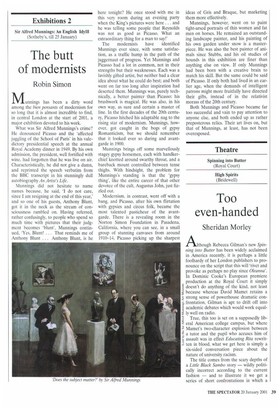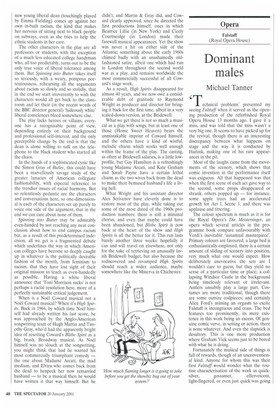Spinning into Butter (Royal Court) High Spirits (Bridewth)
Too even-handed
Sheridan Morley
Athough Rebecca Gilman's new Spinning into Butter has been widely acclaimed in America recently, it is perhaps a little foolhardy of her London publishers to pronounce on the script that this will 'rivet and provoke as perhaps no play since Oleanna'. In Dominic Cooke's European premiere production at the Royal Court it simply
= doesn't do anything of the kind, not least because whereas David Mamet retains a strong sense of powerhouse dramatic confrontation, Gilman is apt to drift off into g academic debates which would work equally well on radio.
3 True, this too is set on a supposedly liberal American college campus, but where Marnet's two-character explosion between
15 a tutor and the pupil who accuses him of assault was in effect Educating Rita rewritten in blood, what we get here is simply a six-sided conversation piece about the nature of university racism.
The title comes from the scary depths of a Little Black Sambo story — wildly politically incorrect according to the current fashion — and to illustrate it we get a series of short confrontations in which a new young liberal dean (touchingly played by Emma Fielding) comes up against her own in-built racism, the kind that makes her nervous of sitting next to black people on subways, even as she tries to help the ethnic students in her care.
The other characters in the play are all professors or students, with the exception of a much less educated college handyman who, all too predictably, turns out to be the only true voice of liberal tolerance among them. But Spinning into Butter takes itself so seriously, with a weary, pompous portentousness, rehearsing all the arguments about racism so slowly and so stolidly, that in the end we start irreverently to wish the characters would all get back to the classroom and let their (in the recent words of the BBC director general) 'hideously white' liberal consciences bleed somewhere else.
The play lacks heroes or villains; everyone has a recognisable point of view, depending entirely on their background and professional self-interest, and the only perceptible change by the end is that the dean is alone willing to talk on the telephone to the black student who started all the chaos.
In the hands of a sophisticated cynic like the Simon Gray of Butley, this could have been a marvellously savage study of the greater lunacies of American collegiate fashionability, with especial reference to the trendier issues of racial harmony. But so relentlessly pedantic are the characters and conversations here, so one-dimensional is each of the characters set up purely to voice one side of the argument, that in the end we can care about none of them.
Spinning into Butter may be admirably even-handed by not reaching any neat conclusion about how to end campus racism but, as a result of this predetermined indecision, all we get is a fragmented debate which underlines the way in which American colleges have become so deeply caught up in whatever is the politically desirable fashion of the month, from feminism to racism, that they have lost sight of their original mission to teach as even-handedly as possible. Having a white liberal announce that 'Toni Morrison sucks' is not perhaps a racial resolution here, more of a perfectly sustainable critical judgement.
When is a Noel Coward musical not a Noel Coward musical? When it's High Spirits. Back in 1964, by which time Noel himself had already written his last score, he was approached by the Anglo-American songwriting team of Hugh Martin and Timothy Gray, who'd had the apparently bright idea of resetting Coward's Blithe Spirit as a big, brash, Broadway musical. As Noel himself was no slouch at the songwriting, you might think that had he wanted his most commercially triumphant comedy — the one about Madame Arcati, the mad medium, and Elvira who comes hack from the dead to henpeck her now remarried husband — to be a musical then he would have written it that way himself. But he didn't, and Martin & Gray did, and Coward clearly approved, since he directed the first productions himself, ones in which Beatrice Lillie (in New York) and Cicely Courtneidge (in London) made their farewell musical appearances. Yet the show was never a hit on either side of the Atlantic; something about the early 1960s chimed badly with an unashamedly oldfashioned satire, albeit one which had run in London throughout the second world war as a play, and remains worldwide the most commercially successful of all Coward's stage work.
As a result, High Spirits disappeared for almost 40 years, and we now owe a considerable debt of gratitude to Raymond Wright as producer and director for bringing it back for the first time, albeit in a very scaled-down version, at the Bridewell.
What we get there is not so much a musical as a play with songs, but at least one of those (Home Sweet Heaven) bears the unmistakable imprint of Coward himself, and the others have a kind of wistful, melodic charm which works well enough within the frame of the play. The casting, as often at Bridewell salaries, is a little lowprofile, but Gay Hamilton is a refreshingly young Madame Arcati, and Kate Graham and Sarah Payne have a certain lethal charm as the two wives back from the dead to make their bemused husband's life a living hell.
What Wright and his assistant director Alex Scrivenor have cleverly done is to restore most of the play, while taking out some of the most dated of the 1960s production numbers; there is still a minimal chorus, and even that maybe could have been abandoned, but Blithe Spirit is now back at the heart of the show and High Spirits is all the better for it. This run lasts barely another three weeks; hopefully it can and will travel on elsewhere, not only for the sake of retrieving an unusually lavish Bridewell budget, but also because the rediscovered and revamped High Spirits should reach a wider audience, maybe somewhere like the Minerva in Chichester.































































 Previous page
Previous page